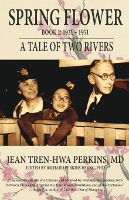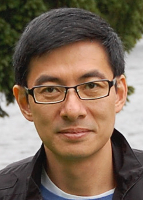
Image by Dean Moriarty
My mother's memoir recounts her life and upbringing in China and her relocation to the U.S. after being adopted by American medical missionaries. It’s titled Spring Flower. She passed away before completing her story. As per my promise to her, I helped her complete it.
I can see now that my work on my mother’s memoir began when my mother and I worked together in the early 1980s, continued during meals with Aunt Dee, and became more serious when I received the metal suitcase filled with my grandmother’s photos. My preparation for this task came to fruition after I learned English well enough to write, while earning a Ph.D. and teaching college chemistry for 25 years.
When my mother passed away in the spring of 2014, my father gave me three boxes with my mother's typed manuscripts, handwritten chapters, and notes. Only then did I find out that my father had tried but failed to complete his wife’s memoir—in Chinese, including translating what she had already written! At that moment, I realized that everything in my life had prepared me for this huge task, and over time, I discovered that my life’s purpose has always been to complete her memoir.
The Toll on My Mother
After spending most of the 1980s writing her memoir, my mother began slowing down, and by the early 1990s, her work had come to a halt. I didn't know why, having worked diligently for more than ten years, yet I knew she was unhappy and wasn’t taking good care of herself. When I’d visit her in Boston, I saw that she was anemic and alarmingly Vitamin B12 deficient. But I was pursuing a Ph.D. in chemistry at the University of Chicago and couldn’t be there regularly. I thought her unhappiness was because of her struggles obtaining U.S. citizenship.
When she died in 2014 after a 16-year battle with dementia, along with the boxes of her notes and draft manuscripts, I was given sixty 4" x 3" books with tiny words filling each page, dated from 1988 through 1992. When I read a few pages from these pocket-sized books; I repacked them and wrote myself a note: "Diaries of a Seriously Depressed Human.”
I knew then that writing her memoir, dredging up so much ancient trauma, was a primary cause of my mother’s depression. Writing her memoir and especially the notes in these dark journals might, ironically, have kept her alive longer. They were a kind of S.O.S., an expression of the duress she was feeling.
My mother’s book has more than a few joys and successes, but overall, it’s a tragic story spanning half a century, and writing it forced her to recall that tragic past. We often prefer to bury painful memories, but writing a memoir requires multiple drafts reviewing the details of a life.
It’s a little like the movie “Groundhog Day,” where the Bill Murray character is forced to relive the same day over and over. Only when the writing rings true can an author (or Bill Murray) wake up one day and move on to the next chapter. This cruel exercise led to my mother’s depression, which is a common precursor of dementia.
The Toll on Me
To complete my mother’s memoir, I had to compose those unfinished chapters, particularly the ones that took place during my childhood. I was repeatedly reliving the same painful stories as my mother had. The emotional and mental stress from editing and writing had triggered my allergies.
In early 2018, I developed a serious skin allergy. The sight of rapidly spreading rash was terrifying. I would lay on a cold floor for hours while the inflammation slowly dissipated. Some episodes took days. My visual field became a composite of ceiling designs from laying on different floors of the places I worked on the memoir.
With a weakened immune system, a few months later, I caught a severe respiratory infection, a perfect storm that led to a debilitating condition called laryngospasm due to damage to the vocal cords’ nerves from excessive coughing. Symptomatically, laryngospasm involves the shutting of the hypersensitized vocal cords, allowing air to come out of the lungs but not go in, the opposite of asthma. An attack would last as long as 90 seconds, the threshold before serious damage could incur. And unlike asthma, an inhaler cannot help.
These attacks can be sudden. Every time I thought I was about to die, my body would slump to the ground, and my vocal cords would relax and reopen. It took a lot of medical help and physical therapy for me to learn how to breathe, speak, and pronounce letters and syllables again.
Still, the attacks continued, mostly in the early dawn when I was jolted awake by a lack of oxygen. So, I slept progressively less in anticipation of the next episode. Sometimes I'd stay up all night. At dusk, I would watch the sun set slowly in the West, with darkness overtaking the night sky. As a floodlight shone on a cross on the rooftop of a nearby church, fear gripped me, and the words of my mother's diaries began to haunt me.
Completing My Mother's Memoirs
As I stared at the antidepressants prescribed for me to remain calm and be able to sleep, I remembered the story of Iris Chang, an American journalist and author who died tragically from depression after publishing her book The Rape of Nanking, chronicling the Nanking Massacre during WWII. I was heading down a similar dark tunnel, as the state of my mind had become eerily close to some of her last words.
“My god,” I thought, "I don’t want to die for my mother’s book, or any book!" So, for the next few months, I forged ahead until one day, like my mother, I came crashing to a halt. I experienced a total mental paralysis—I couldn’t write a single word.
I had heard about a therapist who, when working with combat veterans, doesn’t dive right into their traumas but creates a safe space first, reviews a bigger picture of their “soul’s journey,” and slowly and carefully leads the patient to turn towards the trauma. This alternative practice goes against the mainstream, I believe, which encourages veterans to face their trauma right away. But it is gentler and turns out to be what I needed, too.
A few weeks later, I called the woman who had been my therapist 20 years earlier in Minneapolis. She was surprised and delighted that I called her, especially after I said, “When we met twenty years ago in your office, I didn't care if I died, but today, I am calling you because I want to live.”
Searching for A Safe Place
I never knew how extreme an impact reviewing one’s life can have, or writing a book about it. I’ve learned that in facing traumatic memories, it’s essential to have the support you need to proceed.
Amid searching for a safe space, I was advised to consider reaching out to others who had written painful memoirs. So, I visited my cousin in Boston. She is an author and recommended an editor in Hawai'i who she thought might be able to help. And he did, not just because of his skills in expressing the book’s narrative clearly but also, perhaps more importantly, he didn't carry the emotional burdens that had affected our family so tragically.
Having a “neutral” third party on the “team” helped create the space I needed to not relive the traumas so fully, but to focus instead on telling the story. The same editor later told me that almost every Hawaiian song ends with the line: Ha'ina 'ia mai ana ka'puana, which means, "And so the story is told.”
At last, after so many ups and downs, I feel that way now. My mother’s memoir has been told, and the outcome for me (and, I hope, for her) is redemptive and even healing, having faced the demons and seen our way through.
Copyright 2024. All Rights Reserved.
Book by this Author:
BOOK: Spring Flower (Book 1)
Spring Flower: A Tale of Two Rivers (Book 1)
by Jean Tren-Hwa Perkins and Richard Perkins Hsung
 The story of one woman's journey from poverty to privilege to persecution, and her determination to survive as history and circumstance evolved around her. Tren-Hwa ("Spring Flower") was born in a dirt-floored hut along the Yangtze River in Central China during the catastrophic floods of 1931. Her father was so upset she was a girl, he stormed out of the hut, and she was given up for adoption to a missionary couple, Dr. Edward and Mrs. Georgina Perkins.
The story of one woman's journey from poverty to privilege to persecution, and her determination to survive as history and circumstance evolved around her. Tren-Hwa ("Spring Flower") was born in a dirt-floored hut along the Yangtze River in Central China during the catastrophic floods of 1931. Her father was so upset she was a girl, he stormed out of the hut, and she was given up for adoption to a missionary couple, Dr. Edward and Mrs. Georgina Perkins.
Renamed Jean Perkins, she attended English-speaking schools in China, went to high school in New York near the Hudson River, and then after World War II returned to China with her parents. Spring Flower is both eyewitness history and the eloquent memoir of a young girl growing up during the brutal Japanese occupation and the communist takeover of China. In 1950, with the Korean War raging, Jean's adoptive parents had to flee China, leaving her behind....
For more info and/or to order this book, click here. Also available as a Kindle edition.
About the Author
 Richard Perkins Hsung is the editor of Spring Flower, his mother’s memoir. After coming to America, Richard attended Milton Academy, Milton, Mass., as many of the Perkins children had. He earned his BS in Chemistry and Mathematics from Calvin College in Grand Rapids, Michigan.
Richard Perkins Hsung is the editor of Spring Flower, his mother’s memoir. After coming to America, Richard attended Milton Academy, Milton, Mass., as many of the Perkins children had. He earned his BS in Chemistry and Mathematics from Calvin College in Grand Rapids, Michigan.
His mother, Jean Tren-Hwa Perkins, passed away in 2014. Her manuscript, started in 1982, was perhaps thousands of pages, and Richard wondered how he could fulfill the promise he’d made to finish the memoirs she had started. He had helped her organize photos, letters, and archival documents and when his mother passed away, his father gave him three boxes with his mother's typed manuscripts, handwritten chapters, and notes. She had created a partial first draft, and Richard took the story the rest of the way, relying on archives (including letters), memories, interviews, and some imagination. The amazing result is Spring Flower, Books 1, 2 and 3.
Visit his website at https://www.yangtzeriverbythehudsonbay.site/mini-series.html
More books by this Author (Books 1, 2 and 3 of Spring Flower).

























